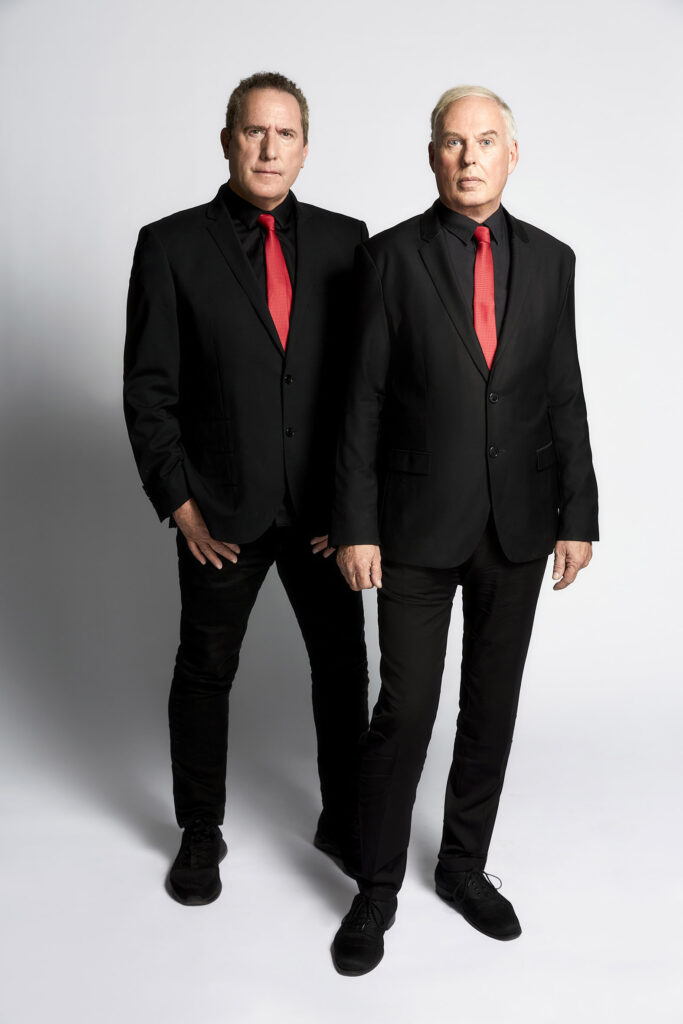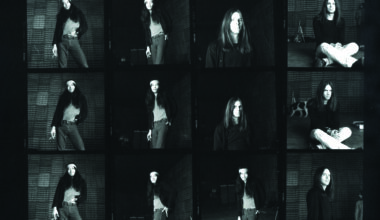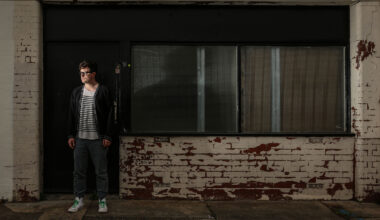Andy McCluskey and Paul Humphreys of Orchestral Manoeuvres In The Dark are still coming up with the goods 45 years in. Their new album, ‘Bauhaus Staircase’, a glorious collision of hook-laden electropop and artistic sentiment, finds the synth pioneers in perfect sync
Andy McCluskey and I are discussing AI, which feels like a fairly logical segue after we’ve covered some of the contemporary sociopolitical themes that appear in the lyrics of ‘Bauhaus Staircase’, Orchestral Manoeuvres In The Dark’s 14th studio album.
“We’ve been asked a lot about that this time round,” he says, with a deflated sigh. “As far as I can see, in the foreseeable future, no algorithm could create a process that will write proper songs. They’re always going to be pastiches, because they’ve analysed something that’s already been done.”
He pauses for a moment, giving a little smile before wryly offering a typically appropriate observation.
“I mean, it’s like most bands of our age trying to write new albums,” he says. “Quite frankly, it feels as if they’ve done it by asking AI, ‘What chords do we normally use?’ or ‘What electronic sounds do we usually use in our songs?’. Sorry, I’m being cruel, but I think it’s probably fair.”
This isn’t a charge that can be levelled at ‘Bauhaus Staircase’. It’s undoubtedly recognisable as an Orchestral Manoeuvres In The Dark album. All of the OMD staples are here in abundance – the trademark choral sample, clever lyrics, big choruses, electronic pop largesse – but it’s also resolutely fresh and modern.
There is no sense that McCluskey and his OMD partner Paul Humphreys are simply going through the motions, even though, 45 years after the band was founded, they’d be more than entitled to.
“There wasn’t really pressure to make an album with ‘Bauhaus Staircase’,” offers Humphreys. “But there was pressure to make a good album. We’ve always had high standards, from the very beginning. We’ve never wanted to release a record that was purely branding for the next tour – we want to put out a record we are proud of. That’s always where the pressure comes from.”
‘The Punishment Of Luxury’, the last OMD album, was released in 2017. Although it was well-received by critics and fans, Humphreys admits to being completely exhausted by the promotion and touring in the wake of its release.
“We’re acutely aware of our age and energy levels,” he says. “We’re not kids anymore.”
Both McCluskey and Humphreys are now in their mid-60s. Despite not looking their age or betraying any signs of wear and tear, they can be forgiven for not being prepared to come off tour and immediately throw themselves back into recording like they could in the 1980s. After ‘The Punishment Of Luxury’, there was no real plan or urgency to do anything else.
And then the 2020 lockdown arrived. McCluskey spent the time at home in Liverpool, while Humphreys and his wife relaxed in France. Let’s just say that maybe they were a little too relaxed.
“All of a sudden, we were pregnant,” he laughs. “We went to the local pharmacy and bought a whole pile of pregnancy tests, and they were all positive. So I was dealing with all that stuff, and then Andy called me and said, ‘Paul, I’m really, really bored. Have you got any ideas I could work on?’.”
“There was nothing to do,” adds McCluskey. “It was like being a teenager when my mother was watching a programme on TV I didn’t want to watch. I would go to my room and do something else. That was exactly what it was like.”
This was virgin territory for the duo. Everything they’d done before had been made in a studio together.
“The biggest challenge in writing music in OMD is actually getting Paul to deliver something,” jokes McCluskey. “It takes forever to get anything out of him. There are tumbleweeds in Paul’s computer waiting for him to do some work. At least when he’s with me, I can say, ‘Get back in that room and write something!’.
There is a genuine spark when we write together. There always has been and always will be.”
In his efforts to appease McCluskey’s abject boredom, Humphreys alighted on some hard drives in a drawer, many of which hadn’t been touched for a decade. The drives contained kernels of ideas he and McCluskey had worked on, material intended for a second album by Onetwo (his synthpop project with Propaganda’s Claudia Brücken) and unused solo work written for adverts.
“I found myself sitting in my room, waiting for Bad Santa Humphreys to drop me any kind of toy with broken wheels to work with,” recalls McCluskey. “Fortunately, one of the first things he sent was the outline of ‘Look At You Now’, which he gave me on the day he told me his wife was expecting a baby. I think I only got it because he wrote it for an advert for his wife’s perfume company and she rejected it. I then had to work my magic on it and turn it into what it became – an OMD song.”
It was the first step on their ‘Bauhaus Staircase’.

Photo: Ed Miles
The next backing track Humphreys sent over evolved into ‘Anthropocene’, one of the standout moments on ‘Bauhaus Staircase’. The song can be traced back to classics like ‘Enola Gay’, where a terrifying subject – in this case, humankind’s impact on the Earth and a grim prognosis for our eventual self-inflicted demise – is set to danceable electronics.
‘Anthropocene’ features a continuation of McCluskey’s interest in text-to-speech tools, which he’d explored on ‘The Punishment Of Luxury’, and on ‘Genetic Engineering’ 40 years earlier.
“I’d been wanting to write a song called ‘Anthropocene’ for a while,” explains McCluskey. “I’d had two goes at it, which weren’t working. Once I put the text-to-speech on it, I played my son the old version and Paul’s version and he went, ‘Dad, it’s a no-brainer. Don’t even think about yours. Paul’s music is much better’.”
Despite not being in the same room, and the distraction afforded by Humphreys’ impending fatherhood, the pair found a working rhythm not too dissimilar to their usual process. Ideas would be initiated in the studio and then get worked on by McCluskey afterwards.
“The songs almost always come to life on my computer,” he says. “People make an incorrect assumption that I do the words and Paul does the music, but we both do the music. What helps these days is, because we’re not in the same room, we now have identical twin ProTools systems. I can send Paul the complete file and he’s got all the soft synth plugins. We’d always rather be in the same room, but that wasn’t an option this time. In the end, out of necessity, we found a process that really worked for this album.”
At once unfathomable, artistic and wilfully inscrutable, it’s hard to think of a title more suited to OMD than ‘Bauhaus Staircase’. Its reference to the Bauhaus school’s adventurous modernist architectural innovation also nods gently in the direction of 1981’s ‘Architecture & Morality’, the band’s landmark third album.
“It’s been a tradition of ours to have bonkers, unusual titles,” admits Humphreys. “When we came up with ‘Architecture & Morality’, we saw it as a description of the way the band works. We saw the ‘architecture’ as the bare bones of our music, in a very structured way, and the ‘morality’ was all the beauty over the top.”
“I’m the artist and Paul’s the electrician,” agrees McCluskey. “It’s two more ways in which we’re very different from each other. I was supposed to go to Leeds to do a fine art degree, but the band started in 1978 and I never went. I would have been there with Marc Almond and Dave Ball from Soft Cell, and Green Gartside from Scritti Politti. It was the place to be… except I wasn’t there.
”The album’s title comes from a wonderfully evocative 1931 painting by Bauhaus artist and designer Oskar Schlemmer, created in response to the news that the school was closing due to the totalitarian grip of the Nazi Party.
I’m a huge fan of early to mid-20th century art. The song ‘Bauhaus Staircase’ is not a history lesson, although it has several references to Josef and Anni Albers, who both taught at the Bauhaus. It’s really just a metaphor for the strength and power of art.”
Bands don’t often make music like this – where smart artistic ideas collide perfectly with accessible, hooky and memorable pop sensibilities – but OMD have always done it. It’s a trait that means this album remains comfortably outside of musical norms – faithful to their myriad accomplishments, yet still indicating they can find plenty of new things to write songs about.
“We’ve always found crazy ideas to make songs out of,” explains Humphreys. “We’ve never been a traditional band. We do have our share of love songs, but not many, and they’re very personal. When we started, we set out to slay the rock ’n’ roll dragon and get rid of all those love song cliches. We just wanted to bring in subjects we were fascinated by and interested in, and we’ve stayed true to those roots. I think you can trace it back to the blueprint of Kraftwerk. They didn’t make love songs, unless they were about trains.”
Humphreys cites the example of ‘Stanlow’ from their 1980 second album, ‘Organisation’. ‘Stanlow’ is a fragile, haunting, wonderfully romantic song. Its subject? The oil refinery at Stanlow, where McCluskey’s father worked. The illuminated sight of the refinery complex on the way back from performing their early gigs signalled that they were nearly home.
For ‘Bauhaus Staircase’, McCluskey found the source material for the album’s beatific, tender moments in more traditional places.
“Love makes the world go round,” he says, deadly serious. “Love is the most powerful force on the planet for human beings, so it ’s appropriate to write songs about it. One thing that we did learn during the pandemic is the capacity for human beings to be kind and empathetic, which I thought was wonderful.
“There are several songs on this album which are, effectively, audio hugs. It’s me saying to people, ‘I know times are hard, but I love you, so here’s a hug. You’re gonna be OK’. I subsequently had to beg the two people I wrote those songs for to let me put them on the album. They are songs for people I really, really cared about.”
Within the standout song ‘Aphrodite’s Favourite Child’, McCluskey leans into that idea to yield one of the finest metaphors he has ever put into song.
“It’s brutal, but it’s the most passionate lyric I’ve ever written,” he says. “‘Hold me like a mother holds her only dying child’ – it’s a way of saying, ‘I love the way you make me feel’ in a completely non-cliched way. Don’t ask me where the line came from. It’s that feeling of somebody giving you every ounce of love they have. We definitely needed that in lockdown.”
Dropped casually in at the end of the press release for ‘Bauhaus Staircase’ is a quote from McCluskey: “I’m comfortable if this is OMD’s last statement.” It gives rise to the frightening notion of this being the band’s final album.
On this topic, both McCluskey and Humphreys are realistic, and both indicate that they would only consider writing another album if they could achieve the same high watermark they’ve always aimed for. It echoes a statement written by Bauhaus founder Walter Gropius in his manifesto, ‘What Is Architecture?’ (1919): “Ideas die as soon as they become compromises.”
“Paul and I were joking yesterday that the hardest thing to do is to write the topline vocal melodies,” says McCluskey. “An instrumental album would be a lot easier. Maybe we’ll do that next.
“It’s a really good time to be Orchestral Manoeuvres In The Dark. People say very nice things about us – that we’re cool and influential and iconic. So the last thing you want to do is screw it all up by dropping a crap album after 45 years. It’s not easy doing good songs, you know. But it’s dead easy to do shit ones.”
‘Bauhaus Staircase’ is out on 100 Percent






